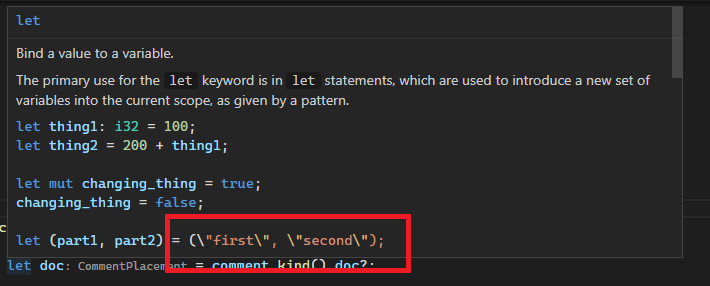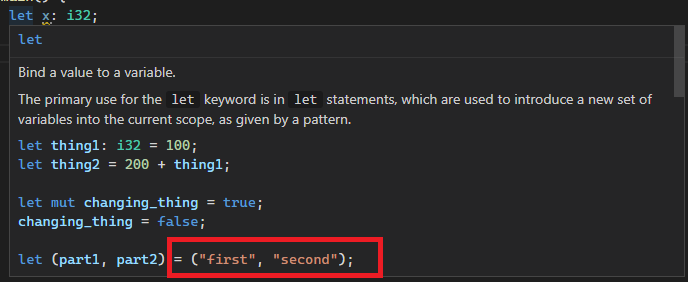The general theme of this is to make parser a better independent
library.
The specific thing we do here is replacing callback based TreeSink with
a data structure. That is, rather than calling user-provided tree
construction methods, the parser now spits out a very bare-bones tree,
effectively a log of a DFS traversal.
This makes the parser usable without any *specifc* tree sink, and allows
us to, eg, move tests into this crate.
Now, it's also true that this is a distinction without a difference, as
the old and the new interface are equivalent in expressiveness. Still,
this new thing seems somewhat simpler. But yeah, I admit I don't have a
suuper strong motivation here, just a hunch that this is better.
The general problem we are dealing with here is this:
```
macro_rules! thrice {
($e:expr) => { $e * 3}
}
fn main() {
let x = thrice!(1 + 2);
}
```
we really want this to print 9 rather than 7.
The way rustc solves this is rather ad-hoc. In rustc, token trees are
allowed to include whole AST fragments, so 1+2 is passed through macro
expansion as a single unit. This is a significant violation of token
tree model.
In rust-analyzer, we intended to handle this in a more elegant way,
using token trees with "invisible" delimiters. The idea was is that we
introduce a new kind of parenthesis, "left $"/"right $", and let the
parser intelligently handle this.
The idea was inspired by the relevant comment in the proc_macro crate:
https://doc.rust-lang.org/stable/proc_macro/enum.Delimiter.html#variant.None
> An implicit delimiter, that may, for example, appear around tokens
> coming from a “macro variable” $var. It is important to preserve
> operator priorities in cases like $var * 3 where $var is 1 + 2.
> Implicit delimiters might not survive roundtrip of a token stream
> through a string.
Now that we are older and wiser, we conclude that the idea doesn't work.
_First_, the comment in the proc-macro crate is wishful thinking. Rustc
currently completely ignores none delimiters. It solves the (1 + 2) * 3
problem by having magical token trees which can't be duplicated:
* https://rust-lang.zulipchat.com/#narrow/stream/185405-t-compiler.2Frust-analyzer/topic/TIL.20that.20token.20streams.20are.20magic
* https://rust-lang.zulipchat.com/#narrow/stream/131828-t-compiler/topic/Handling.20of.20Delimiter.3A.3ANone.20by.20the.20parser
_Second_, it's not like our implementation in rust-analyzer works. We
special-case expressions (as opposed to treating all kinds of $var
captures the same) and we don't know how parser error recovery should
work with these dollar-parenthesis.
So, in this PR we simplify the whole thing away by not pretending that
we are doing something proper and instead just explicitly special-casing
expressions by wrapping them into real `()`.
In the future, to maintain bug-parity with `rustc` what we are going to
do is probably adding an explicit `CAPTURED_EXPR` *token* which we can
explicitly account for in the parser.
If/when rustc starts handling delimiter=none properly, we'll port that
logic as well, in addition to special handling.
FragmentKind played two roles:
* entry point to the parser
* syntactic category of a macro call
These are different use-cases, and warrant different types. For example,
macro can't expand to visibility, but we have such fragment today.
This PR introduces `ExpandsTo` enum to separate this two use-cases.
I suspect we might further split `FragmentKind` into `$x:specifier` enum
specific to MBE, and a general parser entry point, but that's for
another PR!
We generally avoid "syntax only" helper wrappers, which don't do much:
they make code easier to write, but harder to read. They also make
investigations harder, as "find_usages" needs to be invoked both for the
wrapped and unwrapped APIs
8560: Escape characters in doc comments in macros correctly r=jonas-schievink a=ChayimFriedman2
Previously they were escaped twice, both by `.escape_default()` and the debug view of strings (`{:?}`). This leads to things like newlines or tabs in documentation comments being `\\n`, but we unescape literals only once, ending up with `\n`.
This was hard to spot because CMark unescaped them (at least for `'` and `"`), but it did not do so in code blocks.
This also was the root cause of #7781. This issue was solved by using `.escape_debug()` instead of `.escape_default()`, but the real issue remained.
We can bring the `.escape_default()` back by now, however I didn't do it because it is probably slower than `.escape_debug()` (more work to do), and also in order to change the code the least.
Example (the keyword and primitive docs are `include!()`d at https://doc.rust-lang.org/src/std/lib.rs.html#570-578, and thus originate from macro):
Before:

After:

Co-authored-by: Chayim Refael Friedman <chayimfr@gmail.com>
Previously they were escaped twice, both by `.escape_default()` and the debug view of strings (`{:?}`). This leads to things like newlines or tabs in documentation comments being `\\n`, but we unescape literals only once, ending up with `\n`.
This was hard to spot because CMark unescaped them (at least for `'` and `"`), but it did not do so in code blocks.
This also was the root cause of #7781. This issue was solved by using `.escape_debug()` instead of `.escape_default()`, but the real issue remained.
We can bring the `.escape_default()` back by now, however I didn't do it because it is probably slower than `.escape_debug()` (more work to do), and also in order to change the code the least.
use vec![] instead of Vec::new() + push()
avoid redundant clones
use chars instead of &str for single char patterns in ends_with() and starts_with()
allocate some Vecs with capacity to avoid unneccessary resizing